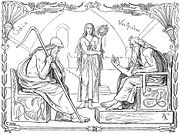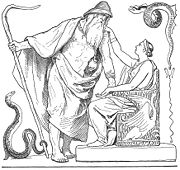
Vafþrúðnismál
Encyclopedia

Norse mythology
Norse mythology, a subset of Germanic mythology, is the overall term for the myths, legends and beliefs about supernatural beings of Norse pagans. It flourished prior to the Christianization of Scandinavia, during the Early Middle Ages, and passed into Nordic folklore, with some aspects surviving...
, Vafþrúðnismál (Vafþrúðnir
Vafþrúðnir
Vafþrúðnir is a wise jötunn in Norse mythology. In the Poetic Edda poem Vafþrúðnismál, Vafþrúðnir acts as both Odin's host and opponent in a deadly battle of wits, resulting in Vafþrúðnir's defeat....
's sayings) is the third poem in the Poetic Edda
Poetic Edda
The Poetic Edda is a collection of Old Norse poems primarily preserved in the Icelandic mediaeval manuscript Codex Regius. Along with Snorri Sturluson's Prose Edda, the Poetic Edda is the most important extant source on Norse mythology and Germanic heroic legends, and from the early 19th century...
. It is a conversation in verse form conducted initially between the Æsir
Æsir
In Old Norse, áss is the term denoting a member of the principal pantheon in Norse paganism. This pantheon includes Odin, Frigg, Thor, Baldr and Tyr. The second pantheon comprises the Vanir...
Odin
Odin
Odin is a major god in Norse mythology and the ruler of Asgard. Homologous with the Anglo-Saxon "Wōden" and the Old High German "Wotan", the name is descended from Proto-Germanic "*Wodanaz" or "*Wōđanaz"....
and Frigg
Frigg
Frigg is a major goddess in Norse paganism, a subset of Germanic paganism. She is said to be the wife of Odin, and is the "foremost among the goddesses" and the queen of Asgard. Frigg appears primarily in Norse mythological stories as a wife and a mother. She is also described as having the power...
, and subsequently between Odin and the giant Vafþrúðnir. The poem goes into detail about the Norse cosmogony and was evidently used extensively as a source document by Snorri Sturluson
Snorri Sturluson
Snorri Sturluson was an Icelandic historian, poet, and politician. He was twice elected lawspeaker at the Icelandic parliament, the Althing...
in the construction of the Prose Edda
Prose Edda
The Prose Edda, also known as the Younger Edda, Snorri's Edda or simply Edda, is an Icelandic collection of four sections interspersed with excerpts from earlier skaldic and Eddic poetry containing tales from Nordic mythology...
who quotes it. The poem is preserved in Codex Regius
Codex Regius
Cōdex Rēgius is an Icelandic manuscript in which the Poetic Edda is preserved. It is made up of 45 vellum leaves, thought to have been written in the 1270s. It originally contained a further 8 leaves, which are now missing...
and partially in AM 748 I 4to
AM 748 I 4to
AM 748 I 4to is an Icelandic vellum manuscript fragment containing several Eddaic poems. It dates to the beginning of the 14th century. The six sheets which have been preserved contain the following poems, all mythological.*Grímnismál...
. There are preservation problems relating to stanzas 40-41.
Synopsis

On arriving at Vafþrúðnir's hall, Odin seeks to obtain Vafþrúðnir's wisdom through the classic mechanism of a wisdom contest. Vafþrúðnir's response is to accept the wanderer in his hall and only allow him to leave alive if Odin proves to be wiser. Odin, a master of dissimulation, attempts to pass himself off as Gagnráðr (trans. "victory"), and beseeches the traditional hospitality which should be afforded to wayfarers. Vafþrúðnir, wrong-footed, invites him in and to seat himself. A game of riddling then ensues between the pair.
During the course of stanza 19, Vafþrúðnir was unwise enough to wager his head in the case of defeat: victory for Odin will result in his death. In stanza 55, at the conclusion of the contest, Vafþrúðnir is obliged to capitulate to Odin's cunning when Odin asks him what Odin whispered in Baldr's ear prior to Baldr's body being placed on the funerary ship
Ship burial
A ship burial or boat grave is a burial in which a ship or boat is used either as a container for the dead and the grave goods, or as a part of the grave goods itself. If the ship is very small, it is called a boat grave...
, a question to which only Odin knows the answer; it is a rule of the wisdom contest that questions could only be asked to which the questioner knew the answer and so it is at this point that Vafþrúðnir recognizes his guest for who he is:
- You alone know that, what long ago
- You said in the ears of your son.
- I doomed myself when I dared to tell
- What fate will befall the gods,
- And staked my wit against the wit of Odin,
- Ever the wisest of all.
- Vafþrúðnismál 55, translated by Auden and Taylor
External links
- Vafthruthnismol Translation and commentary by Henry A. Bellows
- Vafþrúðnismál Translation by Benjamin ThorpeBenjamin ThorpeBenjamin Thorpe was an English scholar of Anglo-Saxon.-Biography:After studying for four years at Copenhagen University, under the Danish philologist Rasmus Christian Rask, he returned to England in 1830, and in 1832 published an English version of Caedmon's metrical paraphrase of portions of the...
- Vafþrúðnismál Translation by W. H. AudenW. H. AudenWystan Hugh Auden , who published as W. H. Auden, was an Anglo-American poet,The first definition of "Anglo-American" in the OED is: "Of, belonging to, or involving both England and America." See also the definition "English in origin or birth, American by settlement or citizenship" in See also...
and P. B. Taylor - Vafþrúðnismál Sophus BuggeSophus BuggeSophus Bugge was a noted Norwegian philologist and linguist. His scientific work was directed to the study of runic inscriptions and Norse philology. Bugge is best known for his theories and his work on the runic alphabet and the Poetic Edda and Prose Edda. -Background:Elseus Sophus Bugge was...
's edition of the manuscript text - Vafþrúðnismál Guðni Jónsson's edition of the text with normalized spelling
Literature
- Vafþrúðnismál, T. W. Machan (ed.), Turnhout, 2008, Brepols Publishers, ISBN 978-0-88844-561-2

